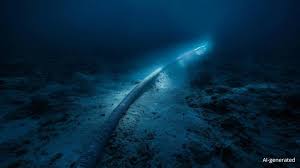The International Telecommunication Union (ITU) and the International Cable Protection Committee (ICPC) have announced the creation of the International Advisory Body for Submarine Cable Resilience, a global initiative to protect critical telecommunications infrastructure.
Co-chaired by Nigeria’s Minister of Communications, Innovation and Digital Economy, Dr Bosun Tijani, and Prof. Sandra Maximiano, Chair of ANACOM’s Board of Directors in Portugal, the advisory body aims to enhance submarine cable resilience through global collaboration and the adoption of best practices.
According to ITU Secretary-General Doreen Bogdan-Martin, Submarine cables support over 99% of international data exchanges and enable essential services such as commerce, finance, governance, digital health, and education. Their resilience is a global necessity.”

The body’s core objectives include promoting best practices for cable deployment and repair; to mitigating risks from human activity, natural hazards, and equipment failure; and ensuring uninterrupted global communications supported by submarine cables.
Submarine cables carry over 99% of international data traffic, yet they face significant threats, as ICPC reports 150–200 faults annually, requiring three repairs weekly, coupled with accidental damage from fishing and anchoring, alongside natural disasters and technical failures.
The inaugural virtual meeting of the advisory body is set for December 2024, followed by a Submarine Cable Resilience Summit in Abuja, Nigeria, in February 2025.
Speaking on the initiative, Dr Tijani said, “Submarine cables are vital to global connectivity but face significant risks. Hosting the inaugural summit in Nigeria underscores our commitment to proactive action.”
The advisory body consists of 40 members, including ministers, regulators, industry leaders, and technical experts. Its diverse composition ensures perspectives from small island states to major global economies are included.
Members will meet twice annually to address infrastructure development, investment, and international policy issues related to submarine cables.
Earlier this year, cable damage disrupted internet services across Africa, affecting countries like Senegal and Ivory Coast. The digital blackout highlighted the vulnerability of submarine cables to accidental damage and natural disasters, impacting businesses, banking, and telecom services.
The new advisory body seeks to prevent similar disruptions by fostering international cooperation and robust resilience measures, ensuring the reliability of critical infrastructure that supports global connectivity and economic stability.


